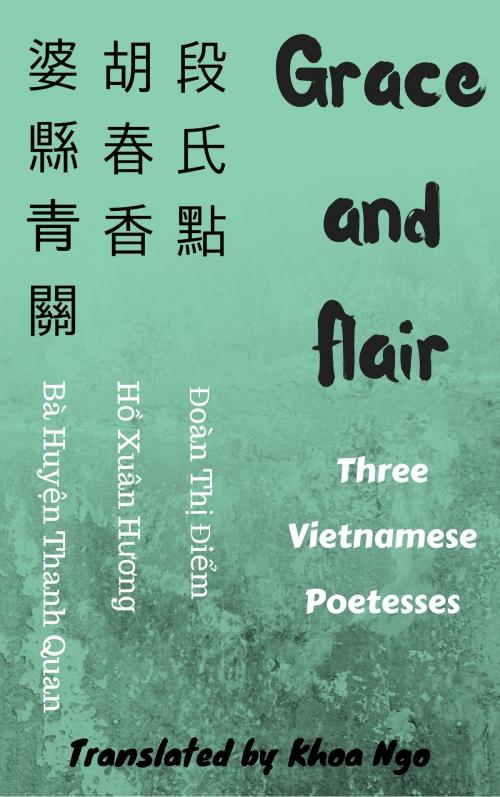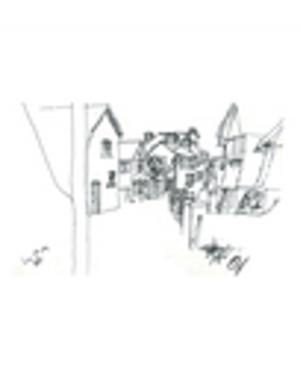| Author: | Khoa Ngô | ISBN: | 9781370414833 |
| Publisher: | Khoa Ngô | Publication: | May 15, 2017 |
| Imprint: | Smashwords Edition | Language: | English |
| Author: | Khoa Ngô |
| ISBN: | 9781370414833 |
| Publisher: | Khoa Ngô |
| Publication: | May 15, 2017 |
| Imprint: | Smashwords Edition |
| Language: | English |
To describe the unstable and subservient fate of women in the feudal world dominated by men, Hồ Xuân Hương (1772 - 1822) wrote these lines for her famous poem Bánh Trôi Nước (A Cake Afloat in Water):
My body is as white as it is round,
Like hills in water, now afloat, now drown’d.
I’m, firm or crumpling, made by kneading hands,
But still, my rouge-red heart I keep thus sound.
Through four simple lines which compare a woman's fate to the image of a floating cake (bánh trôi nước), Hồ Xuân Hương not only expressed her empathy for the women but also sang praises to their undying virtues within, which cannot be destroyed or broken by the outside forces which oppress and confine them.
Back in feudal Vietnam when Confucianism was still the most important doctrine, women were considered to be of the lowest status in society, denied of education in the literature, banned from attending the civil service examinations robbed of rights to inheritance, stripped of freedom of dreams and forced to serve the males of their households. While many accepted such a fate, some did not. They lived and flourished not only in beauty, but also in their poetic prowess. Among them, three stood out in the history of Vietnam.
Through the powerful and captivating qualities of her verses, Đoàn Thị Điểm (1705 - 1749), in her Nôm translation of the Chinese version of Đặng Trần Côn's Chinh Phụ Ngâm (Lament of a Soldier's Wife), sang of the beauty within the heart and soul of a wife whose husband must join a war afar, of her melancholy and boundless fidelity to her family, of her pure love for her men in the war-torn time and of her dreams regarding a happy, peaceful future together once the war has been won.
Through her bold, witty and shocking verses, Hồ Xuân Hương scathingly attacked the society in which men ruled over women. Drawing inspirations from the simplest of images associated with the countryside and from the knowledge of folklore and proverbs, she cleverly wrote poems to express her thoughts as a woman and, more predominantly in her compositions, expose the social injustice which women were forced to endure. Unlike other poets of her time, Hồ Xuân Hương was and still is famous for her various thinly veiled allusions to sex, a taboo in the Confucian society. Her defiant and, more often than not, bawdy verses could have had her executed, and yet, she lived and thrived as one of the most celebrated poetesses in Vietnam's history.
Through her refined, polished yet resonating verses, Bà Huyện Thanh Quan (1805 - 1848) drew inspirations from her natural surroundings and wrote about the melancholy and nostalgia she felt in the time of peace and change, when the golden age of the Later Lê Dynasty was no more. Though she did not leave behind many poems, her masterful and artistic works were testaments to her talent as a poetess.
This book includes some of Đoàn Thị Điểm's, Hồ Xuân Hương's and Bà Huyện Thanh Quan's most popular poems along with their Enlish translations (many of which strive to stay as faithful as possible to the original poems in terms of meaning and form) and annotations so that interested readers can enjoy not only the beauty of their poetry but also the depths of the poetesses' boundless talents.
To describe the unstable and subservient fate of women in the feudal world dominated by men, Hồ Xuân Hương (1772 - 1822) wrote these lines for her famous poem Bánh Trôi Nước (A Cake Afloat in Water):
My body is as white as it is round,
Like hills in water, now afloat, now drown’d.
I’m, firm or crumpling, made by kneading hands,
But still, my rouge-red heart I keep thus sound.
Through four simple lines which compare a woman's fate to the image of a floating cake (bánh trôi nước), Hồ Xuân Hương not only expressed her empathy for the women but also sang praises to their undying virtues within, which cannot be destroyed or broken by the outside forces which oppress and confine them.
Back in feudal Vietnam when Confucianism was still the most important doctrine, women were considered to be of the lowest status in society, denied of education in the literature, banned from attending the civil service examinations robbed of rights to inheritance, stripped of freedom of dreams and forced to serve the males of their households. While many accepted such a fate, some did not. They lived and flourished not only in beauty, but also in their poetic prowess. Among them, three stood out in the history of Vietnam.
Through the powerful and captivating qualities of her verses, Đoàn Thị Điểm (1705 - 1749), in her Nôm translation of the Chinese version of Đặng Trần Côn's Chinh Phụ Ngâm (Lament of a Soldier's Wife), sang of the beauty within the heart and soul of a wife whose husband must join a war afar, of her melancholy and boundless fidelity to her family, of her pure love for her men in the war-torn time and of her dreams regarding a happy, peaceful future together once the war has been won.
Through her bold, witty and shocking verses, Hồ Xuân Hương scathingly attacked the society in which men ruled over women. Drawing inspirations from the simplest of images associated with the countryside and from the knowledge of folklore and proverbs, she cleverly wrote poems to express her thoughts as a woman and, more predominantly in her compositions, expose the social injustice which women were forced to endure. Unlike other poets of her time, Hồ Xuân Hương was and still is famous for her various thinly veiled allusions to sex, a taboo in the Confucian society. Her defiant and, more often than not, bawdy verses could have had her executed, and yet, she lived and thrived as one of the most celebrated poetesses in Vietnam's history.
Through her refined, polished yet resonating verses, Bà Huyện Thanh Quan (1805 - 1848) drew inspirations from her natural surroundings and wrote about the melancholy and nostalgia she felt in the time of peace and change, when the golden age of the Later Lê Dynasty was no more. Though she did not leave behind many poems, her masterful and artistic works were testaments to her talent as a poetess.
This book includes some of Đoàn Thị Điểm's, Hồ Xuân Hương's and Bà Huyện Thanh Quan's most popular poems along with their Enlish translations (many of which strive to stay as faithful as possible to the original poems in terms of meaning and form) and annotations so that interested readers can enjoy not only the beauty of their poetry but also the depths of the poetesses' boundless talents.















